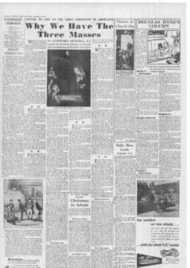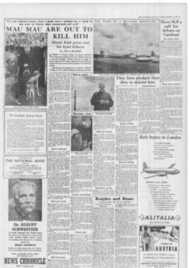Page 4, 4th December 1953
Page 4

Report an error
Noticed an error on this page?If you've noticed an error in this article please click here to report it.
Tags
Share
Related articles
C Old Mows Back In The Forest Shop
Danubian Federation
Church Stronger In Austria, Says Chancellor
Interview With Dr. Gruber.
Whitefr1ars Chro1vicle
ANOTHER PART OF THE FOREST
By
i DANIEL CO UNI A N
BROTHER ANDREW suddenly asked Michael: "In what country would you expect to find ostriches?"
"Austria," Michael said at once, because he had an Austrian stamp at home with the word "Osterreich" printed on it; and surely that meant "ostrich"?
But Brother Andrew laughed like anything. So did the whole class. Michael hated being laughed at, and was still sulking about it when lunchtime came.
A big forest overlapped the grounds of the day school, and Michael and the other boys who brought sandwiches usually went to eat them in a big glade where there was room for football afterwards, or on snowy days, like this one. for slides. But Michael was still so cross that he muttered: "I'm jolly well going to another part of the forest," and slouched off in just any direction, kicking up angry little puffs of snow with his wellingtons.
It probably served him right when, mooning along like that, he suddenly banged into a snow-laden tree branch and sat down with a hump.
ALOT of the snow fell down Ihe top of one of his wellingtons, ' so he took the boot off and shook it. Some big lumps of snow dropped out, and with them, to his surprise, two shiny new pennies. He was so pleased at finding them that he scarcely minded the bump from the tree branch, though it seemed to have made him dizzy.
He walked carefully round the tree and through some bushes, and found himself in a glade he had never seen before. Facing him across untrodden snow was a small building standing alone.
It seemed to be some kind of a shop. Michael ran to see what was in the window, and found it was a very odd collection indeed. There were books in grimy, tattered heaps; vases spilling over with beads. brooches, trinkets and other small things; old boots and hats; urnbh-ellas and sticks; clocks, ornaments and statuettes, including a plaster hunting dog that was peeping out of a Toby jug; a very dirty glass case that seemed to contain some kind of animal; and other things in such a jumble that Michael couldn't make them out.
The object that most took his fancy was a lovely and perfect little ship standing with sails set. She was of wood, three-masted, with a small pointed sail at the stern, a small square one in the bows, and a big one, also square, amidships, with a winged horse painted on it in gold. The winged horse appeared again as the figurehead. Every detail had been beautifully and lovingly made, and Michael felt sure that it was all exactly right. He decided he wanted the ship very badly.
He was turning over his money—a shilling, a threepenny piece and the two pennies—and wondering if so little could possibly be enough to buy the ship, when the green curtains at the back of the window parted, and an elderly man peeped through. He had a high, bald head, bushy white eyebrows and a long nose with tiny spectacles on its tip. He was smiling. and looked kind; so Michael decided there could be no harm in just asking, pushed open the shop door and walked in.
THE shop was crammed to the ceiling with a great muddle of things, and the man was sitting behind a counter, reading. He shut his book with a bang and peered over the top of his spectacles.
He said : "You're a boy, I see. Now what have I got that would do for a boy?"
With a worried expression he began to prowl about the shop, picking things up, staring at them and throwing them down again impatiently.
"I was going to ask—" Michael began.
"How about a warming pan?" The man pulled one from somewhere, and a second later, murmured: "Silly of me. Obviously not your sire. Now here's a nice fur coat, used to belong to a very respectable hear."
"What I wanted to say—" "Not a fur coat? Then perhaps this very superior trouser press? Or a gong? You wouldn't want a framed map of Wiltshire—no, of course not, ridiculous--but these tongs, now, ought to he the very thing—" Michael managed to say at last: "I want to know the price of the ship."
The man hung the map on a hatstand, hurled the trouser press and the gong at a bust of Julius Casar, and bending down. inserted the tongs with great care between the gaping jaws of a stuffed crocodile. When he straightened up, he was looking positively mournful.
"Oh, the ship," he said sadly. "Well now—" "Is it very dear?"
"Not exactly. That is—" The man shifted from one foot to the other guiltily, as if he were a boy caught eating sweets in class. "You see, I don't really want to sell it."
"Then why do you put it in the window?"
"Because it looks so nice. Adds a kind of finishing touch to the arrangement. You don't think it's—er —cheating?"
"No, of course not." Michael was about to add: "Well, thank you. then. Good-bye." But the man looked so sad that he found himself saying instead : "Perhaps there's something else I could buy."
"Yes, yes, indeed. I've a splendid fire extinguisher here, only a little scratched on one side—or this kettleholder—"
Michael said firmly : "Perhaps a book." THF, books seemed very dull; but presently he found one, called Curious Cookerie, that interested him because he wondered if his mother might like it as a Christmas present. It was not a printed book, but had been written .very neatly hy hand in red and black ink. "I he spelling was not the kind that is usual nowadays, but then neither was Michael's own. As he flipped the pages, a recipe caught his eye, headed: "To Make Magick Shippes Biskit." After a glance at this, he asked how much the book was,
The man examined it. "That's a small green book." he said at last. "Small green hooks are usually threepence—if you don't think that's too dear?"
Michael handed over his threepenny-piece—rather absently, because he was absorbed in the recipe. Most of the ingredients seemed fairly ordinary; but there was just one item that puzzled him : "Two sounde and comely haires from the hedde of the tamebeeste."
Daniel Counihan, whose book for children, "Unicorn Magic," has given much pleasure "1 say, what's a tamebeeste?" Michael asked.
The man said : "Form) you should ask that. Don't come across them much nowadays. Matter of fact, though, I've got one. Stuffed, of course. Just one moment."
He reached into the window and lifted on to the counter the dirty glass case M ichael had noticed among the other things. He took off the top, and disclosed an animal about the sire
and shape of a rabbit. Its plumcoloured hair was very short and set close, rather like the plush that sometimes covers the seats in old theatres. Its cars were shaped like fans and delicately edged with gold. It had tiny claws, very blunt; a golden nose, and large, brown, velvety eyes, veiled by drooping lids, with long, silky, golden eyelashes.
Michael said: "I don't think I could afford to buy the whole beeste. But do you think I could have two haires from the hedde?"
"Pleasure. Which two would you like?"
"It doesn't matter—as long as they're sounde—"
''All merchandise warranted sound throughout—" . . and comely. I suppose that means combed."
"We'll comb it right away."
The man took a big ivory comb out of a coffee-pot and did so. "There we are. Help yourself. No charge for those."
Michael plucked his two haires and put them in the back of his season
ticket case. "Thanks awfully I say. I'll have to go now, or I'll be late for afternoon school. But do you think I might come tomorrow and have a look at the ship?"
HE method of making magick shippes biskit, Michael discovered that evening, was like the ingredients
easy until you came to the tame
beeste haires. The book said everything else just had to be mixed in a bowl, but the haircs had to be "grouncle fine betweene two pennies minted in the yeare 1964." And how could this be when that year hadn't happened yet? "What a sell!" Michael said.
You, of course, have probably guessed that those pennies he found in the forest were probably the right ones, since everything else had turned out so conveniently. And you are quite right. But Michael took quite a time to find this out. He tried grinding the haires between the pennies in the hope that just any pennies would do. A tiny heap of plumcoloured dust resulted, and it was only when he was gathering this up that he noticed that the pennies really were dated 1964. He was surprised, pleased and excited. The magic— whatever it might be—that he was hoping to get from his magick shippes biskit seemed to have started even before the biskit was baked.
Many of the other ingredients he found in the kitchen. A few he had to buy at the chemist's, and this took all the money he had. But at last his biskit was ready.
WHEN Michael got to the forest shop at lunch-time next day, the ship was already on the counter waiting for him, and the man standing smiling behind it.
After a long time spent examining the ship, Michael said: "I say, I've got something to show VDU, too. I made some magick shippes biskit from a recipe in the book I bought. But I ate some, and nothing magic happened. It tasted beastly. Here, try a hit."
He handed the biskit across the counter. It looked like a bit of dried
blog comments powered by Disqus















